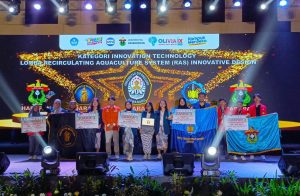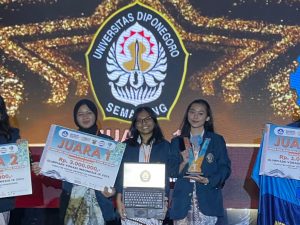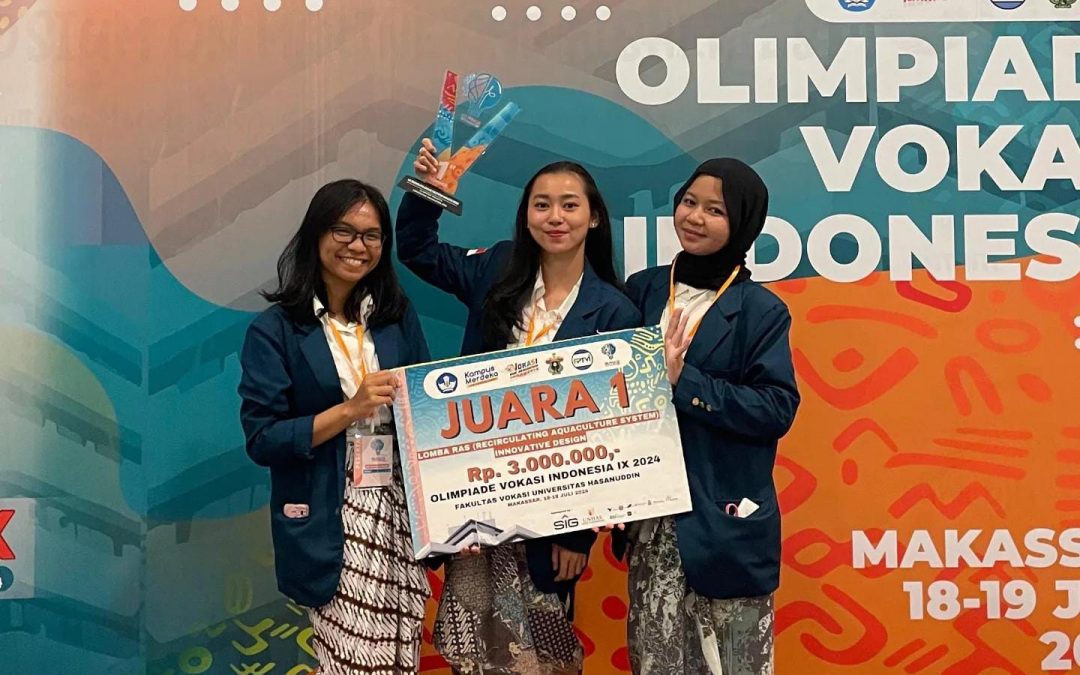Students from the Industrial Chemical Engineering Technology Study Program (TRKI) of the UNDIP Vocational School achieved yet another remarkable feat on July 18–19, 2024, when they took first place in the OliVIa (Indonesian Vocational Olympiad) IX competition held at the UNHAS Hotel & Convention. The RAS (Recirculating Aquaculture System) competition was held at Hasanuddin University, Makassar as part of the Indonesian Vocational Higher Education Forum. Grafena Iridium team members from TRKI SV UNDIP, including post-millennial innovators Tiurma Fransiska Simanullang, Jeni Laura Tesalonika, and Putri Sekar Kinanti, were in attendance at the esteemed event. Using cellphones, they have created a digitized system for fish farming. The head of the TRKI SV UNDIP study program, Mohamad Endy Yulianto, S.T., M.T., expressed his thanks and delight for the Grafena Iridium team’s accomplishments, including winning the national championship. As a supervising instructor, Endy acknowledged that he helped direct the Iridium Graphene team and was an integral part of their continued success. So that improvements to the RAS design may be developed and refined via in-depth talks. The OliVIa IX 2024 event featured six different types of competitions across twenty-three categories, according to Dr. Ir Agustina Abdullah S.Pt., M.Sc., IPM, ASEAN Eng, who is also the chairperson of the committee. Three thousand and two hundred students from seventy universities across Indonesia participated in the event’s 1,068 teams. From those 144 teams, 407 students from 32 different colleges advanced to the championship round. In keeping with its concept, OliVIa IX 2024 focused on technological innovation and entrepreneurship by empowering innovative human resources and digital-based enterprise. This competition series began in March of 2024 with the first round of selection taking place in June of that year. By the end of June, the top five teams had been chosen for the RAS tournament. Event series OliVIa IX 2024 came to a finale with the Grand Final and Awarding, which were carried out as planned.


The name of Tiurma’s invention, Polimonia, was disclosed. This breakthrough uses carbon nanotubes and photovoltaic dielectric membranes to filter water in fish ponds. Featuring a smartphone-digitized ammonia sensor and an alternative energy reserve of solar panels, this breakthrough in aquaculture recirculation systems is promising, eco-friendly, and sustainable. Ammonia levels are a crucial component of the aquaculture environment and a key indicator of water quality. Because an excess of ammonia in the water supply may kill off a large number of fish, its removal is an urgent matter. The digitization of ammonia sensors will allow fish producers to more easily check good water quality, according to Tiurma.
Jeni went on to say that this project’s unique selling point is its hybrid conventional-contemporary pond design, which combines a fresh layout with water circulation and uses solar panels to power pumps, nano aerators, UV filters, and smartphone-connected sensors. With an eye on sustainability and environmental friendliness, it will lessen reliance on traditional energy sources, helping the Indonesian government achieve its goal of zero carbon emissions by the year 2060. According to Jeni, this was communicated by the Coordinating Minister for Maritime Affairs and Investment 2022 at the G20 meeting in Bali. An ammonia sensor and a valve opening were included in the 1:100 scale fisheries pond design that Putri described. The input is that the valve to the polymonia membrane will be expanded if the ammonia level is less than 0.2 ppm. On the other hand, the sensor will trigger a reduction in ammonia if the level goes over 0.7 ppm. “In order to reduce the flow rate and increase the residence time in the polymonia membrane, which in turn increases the quality of the fish,” he stated. Fish may be killed, injured, or stunted in their development if there is an excess of ammonia in the water. Consequently, the society at large may benefit from the digitalization of the produced Polimonia technological breakthrough in the future of fish farming. Putri drew the conclusion that future-positive solutions are possible via creative technological means of cooperation.


Recent Comments